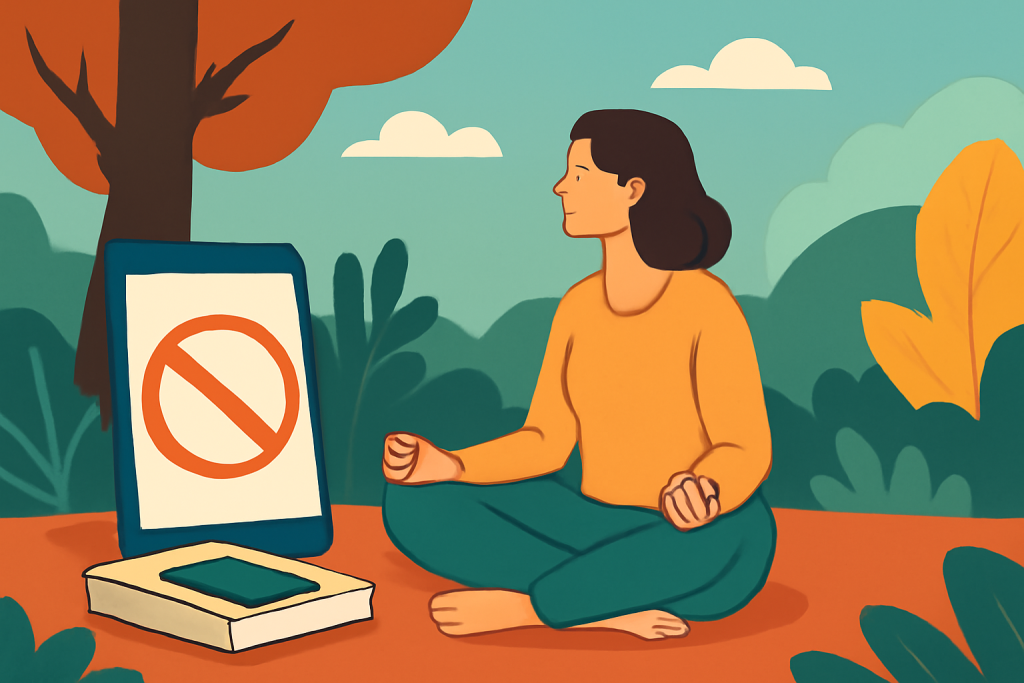It’s easy to feel overwhelmed by constant notifications, endless to-do lists, and the relentless pressure to do more. But what if the key to a more fulfilling life lies not in adding more tasks to your schedule, but in embracing the power of intentional focus? In this article, we explore how designing your life around intentional focus, through strategies like digital detox and mindful living, can transform the way you experience both work and personal life.

What is Intentional Focus?
Intentional focus is a lifestyle choice that centers on dedicating your attention to what truly matters to you, whether that’s your career, relationships, health, or hobbies. It’s about being present in the moment, eliminating distractions, and creating an environment that allows you to concentrate on one task at a time. While it’s easy to get caught in the trap of multitasking and chasing after every new opportunity, intentional focus encourages a simpler, more purposeful approach.
This approach has gained significant traction as a response to the rising concern over burnout, mental health issues, and the overwhelming effects of technology. By prioritizing intentional focus, individuals can reclaim their time, improve their productivity, and foster a deeper sense of well-being.
The Emerging Trend of Digital Detox
One of the most significant ways to design your life around intentional focus is by engaging in a digital detox. This involves taking deliberate breaks from digital devices such as smartphones, computers, and social media. The overwhelming presence of technology has led to information overload, fragmented attention, and constant distractions, which are detrimental to deep focus and productivity.
The Benefits of Digital Detox:
- Improved Mental Clarity: Constant digital distractions can cloud your judgment and cognitive abilities. Stepping away from technology allows your brain to reset and regain focus on more meaningful tasks (Turkle, 2015).
- Reduced Stress and Anxiety: Research has shown that the more we engage with digital devices, especially social media, the more we increase stress and anxiety levels (Kuss & Griffiths, 2017). Taking breaks helps reduce these effects, providing a sense of calm and relaxation.
- Increased Productivity: When you remove digital distractions, your ability to focus on tasks improves, leading to higher quality work and faster completion times.
How to Start a Digital Detox:
- Set boundaries by scheduling device-free times, especially during meals or before bed.
- Curate your notifications so only important alerts get through.
- Engage in non-digital hobbies like reading, cooking, or exercising to fill the gap left by screen time.
- Designate tech-free zones in your home or workspace to create a physical environment that fosters focus.
Mindful Living: A Key to Intentional Focus
Another cornerstone of designing your life around intentional focus is the practice of mindfulness. Mindfulness involves paying attention to the present moment without judgment, whether you’re working, interacting with loved ones, or simply enjoying a cup of coffee. By incorporating mindfulness into daily life, you can reduce stress, improve your focus, and develop a deeper connection with yourself and others.
The Science Behind Mindfulness:
Studies have shown that mindfulness practice can alter brain function, helping individuals manage their emotions, improve focus, and increase empathy (Zeidan et al., 2010). It also enhances self-awareness, making it easier to identify distractions and deal with them more effectively.
How to Practice Mindfulness:
- Start with meditation: Even five minutes of deep breathing or guided meditation can set a positive tone for your day.
- Practice single-tasking: Focus on one task at a time, whether it’s responding to an email or enjoying a walk in nature.
- Engage in mindful listening: When interacting with others, give them your full attention, leaving distractions behind.
The Role of Intentional Focus in Achieving Work-Life Balance
Work-life balance is another area where intentional focus can play a transformative role. Too often, people overextend themselves in the workplace, neglecting their personal lives and well-being. By setting clear intentions for how you spend your time, you can achieve a more harmonious balance between your professional and personal life.
Practical Steps to Achieve Work-Life Balance:
- Prioritize your tasks: Use a task manager or calendar to plan your day, focusing only on the most important activities.
- Set boundaries with work: Avoid checking work emails after hours and dedicate time to relax and unwind.
- Delegate when necessary: Don’t hesitate to ask for help when you’re feeling overwhelmed, whether at work or home.
- Schedule downtime: Whether it’s yoga, a weekend trip, or simply enjoying a hobby, make sure to carve out time for yourself.
The Future of Intentional Focus
The concept of intentional focus is not just a passing trend—it’s a response to the increasing demands of modern life. As we continue to navigate the challenges of a hyper-connected world, more individuals are looking for ways to create a life that feels purposeful, balanced, and manageable.
The future of intentional focus could involve more widespread adoption of digital wellness tools, such as apps designed to limit screen time or foster mindfulness. We may also see a greater emphasis on workplaces promoting mental well-being and encouraging employees to embrace focused work periods and digital detox practices.
Conclusion
Designing your life around intentional focus isn’t about depriving yourself of technology or rushing through your days. It’s about creating space for what truly matters—whether it’s your career, family, or personal well-being—and learning to direct your attention where it counts. By embracing strategies like digital detox and mindful living, you can improve your mental health, increase productivity, and achieve a deeper sense of satisfaction in all areas of life.
If you’re ready to take control of your attention and design a life centered around intentional focus, now is the time to start. The small changes you make today can lead to big rewards in the future.
References:
- Kuss, D. J., & Griffiths, M. D. (2017). Social Networking Sites and Addiction: Ten Lessons Learned. International Journal of Environmental Research and Public Health, 14(3), 311. Available at: https://www.ncbi.nlm.nih.gov/pmc/articles/PMC5378365/
- Turkle, S. (2015). Reclaiming Conversation: The Power of Talk in a Digital Age. Penguin Press.
- Zeidan, F., Johnson, S. K., Diamond, B. J., & David, Z. (2010). Mindfulness Meditation Improves Cognition: Evidence of Brief Mental Training. Consciousness and cognition, 19(2), 597-605. Available at: https://doi.org/10.1016/j.concog.2009.12.019









